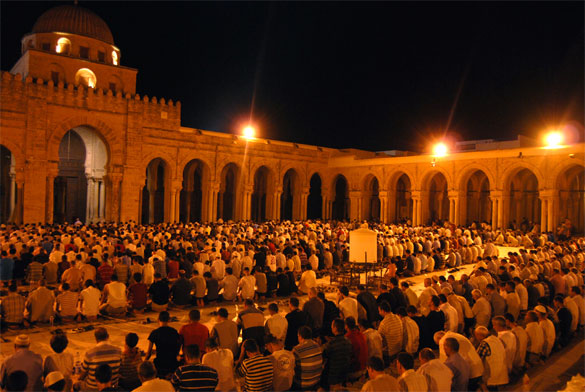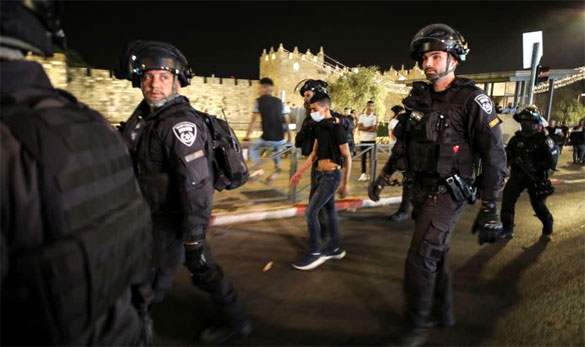
By Arman Neyazi, New Age Islam
30 April 2021
In Islamic Parlance a Leader Must Possess the Qualities of Accountability, Consultation, and Consideration
Main Points:
1. Today's leaders are the by-product of greed, dishonesty and incompetence.
2. A leader in Islam means a responsible guardian of the society.
3. Islamic tenets of a leader start with the quality of accountability.
4. Being untrustworthy and unaccountable to a creation of Allah is like being unworthy of His vicegerent
-------
World media has become dedicated to stories of Covid-19 alone, as nothing else is happening anywhere either in the field of economy, trade or technology. All the scientific researchers and their leaders are engaged in a fight against the time. Lots of good news have come forward from the field of medical science and the researchers certainly deserve a big applause in uncertain terms. But has politics taken a backseat during these troubled times? Not at all. Neither it should. Rather it is the troubled and trying times that the best leaders and the qualities of good leadership come forward.
In the words of Warren Bennis, "Leadership is the capacity to translate vision into reality”. Most of contemporary leaders do not have seem to have any vision. These leaders are the by-product of greed, dishonesty and incompetence.
The world, therefore, needs to look for such leaders who are competent, have the knack of consulting experts around them and carry high-level wisdom of accountability and consideration. A leader in Islam means a guardian of the family, the community or the country and that guardian has to guard all the necessities of his area of influence. Prophet Muhammad (SAW) says:
‘Each of you is a guardian and is responsible for his subjects’ (Saheeh al Bukhari: 212).
If we develop the qualities of a good guardian, ours will be a society where we all will be accountable for our responsibilities. Being accountable creates the trust of the society in its leaders. There can not be a people’s leader if there is no trust in him. Islamic tenets of a leader start with the quality of accountability. Islam emphasises accountability to God and the people for the person chosen to lead. The human being is bestowed with the power of learning so he should learn about the religious leaders who led their people being within the command of Allah, the Almighty, who has sent humankind as His vicegerent on earth. Allah, the Most Merciful says in the Holy Quran:
‘Note that occasion, when your Lord said the angels: I am going to place a vicegerent on earth’ (Qur’an -Surat al Baqarah Ayat 30)
What more did we expect from Allah the Almighty who called us His vicegerent. Being a vicegerent of Allah, any kind of unholy act does not suit us. The human being must therefore respect this kindness of Allah and create qualities of a good leader that is accountable to God and His people of their respective societies. Following Hadees explains the value and importance of being accountable to God and trustworthy to His people otherwise he will not be one among those who will be rewarded heaven for their good deeds:
‘If a person dies having cheated the people s/he was entrusted with, he will not enter paradise’ (Muslim, 2000).
Any person (leader) who cheats the people under his influence will be deprived of a place in heaven no matter what good he has been doing all through his life. Being untrustworthy and unaccountable to a creation of Allah is like being unworthy of His vicegerent. Following our great religious leaders through their words and deeds will transform our thoughts and make us able to stand straight in front of Allah’s creation. Be like Caliph Abu Bakr (RA) acting on his words he spoke after taking over the Caliphate after our Holy Prophet Muhammad (SAW):
‘I have been made your leader, and I am not better than any of you. Support me if I do well and correct me if I do wrong’ (Al-Salabi, 2001)
Consultation and consideration create a sense and a quality of accountability. We find the leaders among us shying away from all these qualities because they think consulting somebody over something makes them look ignorant and unaware of the happenings around them.
A human being has to be accountable to Allah, the Most Merciful on the Day of Judgement and no one will be able to flee from it as the following Ayat describes:
And [for] every person We have imposed his fate upon his neck,1 and We will produce for him on the Day of Resurrection a record which he will encounter spread open.
[It will be said], "Read your record. Sufficient is yourself against you this Day as accountant." (Surah 17 Al-Isra, Ayat 13-14) — Saheeh International
The word ‘Imam’ which means leader or guide is used by Allah, the Almighty in the Holy Quran. And this title was bestowed upon Hazrat Ibrahim (AS) after he was tried and tested by God through His commands. See the following Ayat:
And [mention, O Muhammad], when Abraham was tried by his Lord with words [i.e., commands] and he fulfilled them. [Allah] said, "Indeed, I will make you a leader for the people." [Abraham] said, "And of my descendants?" [Allah] said, "My covenant does not include the wrongdoers." (Surah Al-Baqarah - 2:124) — Saheeh International
On the Day of Judgement, every human being will be made accountable to himself and there will be no denying the facts as, Allah, the Most Merciful says in the Holy Quran:
(Think of) the Day when We will call every people with their books of deeds. Then the ones who will be given their book in their right hands will read their book (happily) and will not be wronged even to the measure of a fine thread. (Surah Al-Isra - 71) — Mufti Taqi Usmani
With all the true qualities of a leader mentioned in the Holy Quran, our Holy Prophet Muhammad (SAW) lived his pious life as a man of people around him. These were his leadership qualities that brought people under the umbrella of Islam. His leadership qualities interwoven with the commands of Allah the Most Merciful were noticed by his friends and foes alike and this appealed to people to accept him as their leader.
Influencing and bringing the Arabian people of the time of Jahiliyya was a difficult job but his sublime conduct, his simplicity, his honesty and his softness of speech melt the ice and brought people to listen to him with patience. He met people at their houses and at their business places to tell them about his mission.
Prophet Muhammad (SAW)’s leadership qualities brought the people of the dark ages of Arabia who because of their ignorance were busy fighting with each other on petty land disputes and issues of ethnicity, His leadership qualities united them with the message of love and brotherhood, as is reported on the authority of Abu Hamzah Anas bin Malik (AS) — Prophet Muhammad (SAW) said:
None of you [truly] believes until he loves for his brother that which he loves for himself. [Al-Bukhari] [Muslim]
Michael Hart in his book The 100: A Ranking of the Most Influential Persons in History said:
Prophet Muhammad (SAW) was “the only man [we can say leader] in history who was supremely successful on both the secular and religious level”
The qualities of a good leader are:
He Should Be Merciful
Allah, the Most Merciful says in the Holy Quran:
“And We have not sent you, [O Muhammad], except as a mercy to the worlds” (21:107).
He Should be Caring for the Poor
Prophet Muhammad (SAW) never had anything worth mentioning all through his life. He distributed everything he ever had among the poor and destitute of the society and he died instructing his companions (Sahaba) to distribute all that he had among the poor:
"Not even a single Dinar of my property should be distributed (after my death to my inheritors, but whatever I leave excluding the provision for my wives and my servants, should be spent in charity." [Bukhari, “Laws of Inheritance” 33].
He Should Be Just
On being just Allah Almighty says in the Holy Quran:
Have you seen the one who denies the Recompense? For that is the one who drives away the orphan. And does not encourage the feeding of the poor. So woe to those who pray. [But] who are heedless of their prayer - Those who make show [of their deeds]. And withhold [simple] assistance (Quran Surah Al-Ma’un:1-7)
According to the above mentioned Ayat, a leader should try his best to make the lives of the people easier by offering all kinds of assistance needed to them. A leader should never discriminate against his people based on religion, caste or gender etc.
Being a true leader is an honour for it provides opportunities to bring peace and amity, happiness and satisfaction among the people. Service to the people is a service to Allah. Leaders should not indulge in their selfish acts to bring laurel to them. They will get lots more than the worldly laurel, the heaven as promised by Allah, by being just, merciful and caring for the poor.
The horrible time created by the pandemic Covid-19 asks for all the leaders to unite and help each other as in the word of Prophet Muhammad (SAW), ‘Each of you is a guardian and is responsible for his subjects’ (Saheeh al Bukhari: 212). This is a time to act as a guardian and a responsible person of society. Forget your religion, your caste and your region. Let the whole world be a village and all residing in it tied in kinship.
And Allah knows the best.
------
Arman Neyazi is a columnist with NewAgeIslam.com




